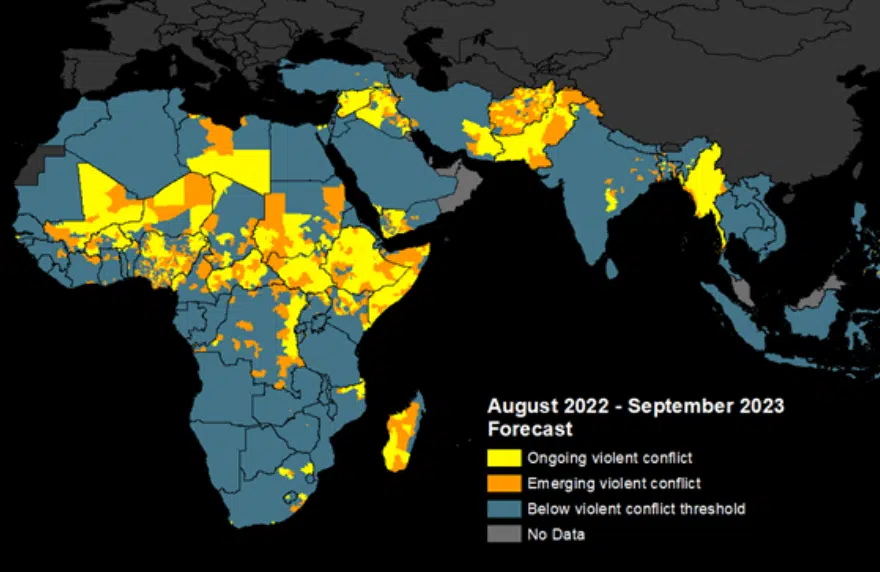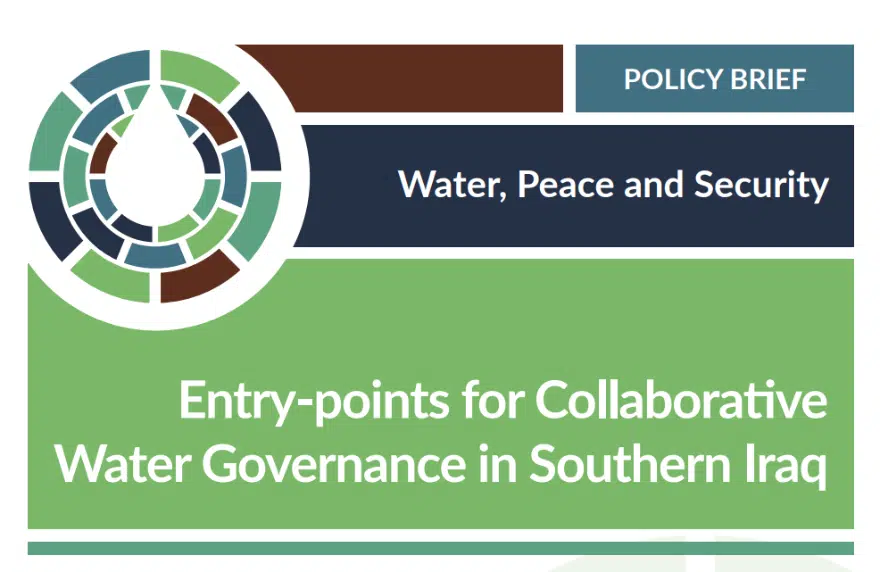Continuing drought brings food insecurity and a risk for emerging or ongoing conflict in Kenya, Ethiopia and Somalia, as well as Iraq, Iran and Afghanistan, according to a new quarterly update that analyses finds from a global early warning tool. Meanwhile, floods in South Sudan and South Africa contributes to a risk of conflict there.
The update, issued by the Water, Peace and Security (WPS) partnership, notes that almost 19 million people in Ethiopia, Kenya and Somalia face acute food insecurity and growing malnutrition. Food shortages caused by drought spanning four consecutive growing seasons are compounded by the Russia-Ukraine war, which has ended much of the region’s grain imports. The drought, which is predicted to continue into the October-December growing season, and the resulting food shortage, contribute to the early warning tool’s predictions of conflict emerging over the next 12 months in most of southeastern Ethiopia and northern Somalia, and ongoing conflict for large parts of the rest of the region.
The tool applies machine learning to predict possible conflict up to a year in advance. The WPS partnership’s latest update is based on an August 2022 analysis and focuses on the next 12 months.
“In current times of global insecurity – characterized by multiple and multi-layered crisis – it is important to keep track of water-related conflict risks in order to engage in early action for conflict prevention and mitigation,” said WPS coordinator Susanne Schmeier, IHE Delft Associate Professor in Water Law and Diplomacy.
“In current times of global insecurity – characterized by multiple and multi-layered crisis – it is important to keep track of water-related conflict risks in order to engage in early action for conflict prevention and mitigation.”
WPS coordinator Susanne Schmeier, IHE Delft Associate Professor in Water Law and Diplomacy
The latest update notes that three years of flooding has left South Sudan facing its highest level of food insecurity since it became an independent country in 2011. Of the 7.7 million people considered to be enduring a food crisis, 87,000 are facing possible famine. With donors’ attention shifting to war-ravaged Ukraine, humanitarian food assistance is cut doe to funding shortages. The update predicts that most of South Sudan will continue to be stricken by conflict over the next 12 months.
Both floods and droughts are causing problems in South Africa, with the update predicting ongoing conflict in the areas around the city of Durban over the next 12 months. The city and the surrounding KwaZulu-Natal Province continue to grapple with the aftermath of record-breaking rainfall that caused deadly floods in April. Farther south, the Eastern Cape province struggles with a multi-year drought that has devastated the local economy and left some taps dry, forcing residents to queue for water.
Iraq continues to suffer from low flows in the Tigris and Euphrates rivers, on which Turkey has built a network of dams.
Meanwhile, tensions between Iran and Afghanistan increased after Iranian officials expressed concerns about what they view as too little river flows from Afghanistan. The economic implosion following the Taliban takeover of Afghanistan, as well as drought, flooding and violent storms combined with poor management of water infrastructure and a lack of technical capacity on the side of the Taliban has resulted in 90% of the population going hungry for nearly 10 months. The tool predicts ongoing and emerging conflict in the border areas between Iran and Iraq as well as Iran and Afghanistan.
“In light of the overall instability of the region and the various problematic developments, it is important to keep a close eye on water-related tensions between Afghanistan and Iran,” said Mohd Faizee, Researcher at IHE Delft.
“In light of the overall instability of the region and the various problematic developments, it is important to keep a close eye on water-related tensions between Afghanistan and Iran.”
Mohd Faizee, Researcher at IHE Delft
In addition, the tool predicts emerging and ongoing conflict in Pakistan, which – just like India – has faced unprecedented heatwaves this year.
“This could further intensify tensions not only within but also between these countries, which have in the past already brought them to the brink of conflict – but also made them turn to peaceful dispute resolution mechanisms, such as the Permanent Court of Arbitration in The Hague,” Schmeier said.
The tool is developed and maintained by the IHE Delft-led WPS partnership, which also includes the World Resources Institute, Deltares, The Hague Centre for Strategic Studies (HCSS), Wetlands International and International Alert as well as Oregon State University and Clingendael – the Netherlands Institute of International Relations as associated partners.
Related Resources: Podcast
Listen to a podcast focusing on the Quarterly Update’s findings on Iraq, featuring Laura Birkman, Senior Strategic Analyst and Head of the Climate and Security Program at HCSS.
About the Water, Peace and Security partnership
The WPS partnership was set up in 2018 to pioneer the development of innovative information tools and practical approaches that can support local and international actors who work in high-risk areas. These tools and approaches can help predict and prevent water-related security threats in a timely manner. The WPS partnership includes an expanding group of organizations supported by The Netherlands Ministry of Foreign Affairs and the German Gesellschaft fur Internationale Zusammenarbeit (GIZ). The current partners include: IHE Delft (lead), World Resources Institute, Deltares, The Hague Centre for Strategic Studies, Wetlands International and International Alert. In addition, the consortium collaborates with a growing number of other organizations, including: its associate partners Oregon State University and Clingendael – the Netherlands Institute of International Relations.






